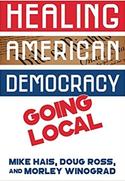Out of the 53 metro areas with more than a million people, only four lost population last year. The two biggest losers were Pittsburgh and Chicago.
Both cities are ones where a significant cadre of local boosters brush off population loss, arguing that a closer look shows that they actually are undergoing a demographic transition that is actually putting them in a stronger position. So let’s take a look. read more »





















